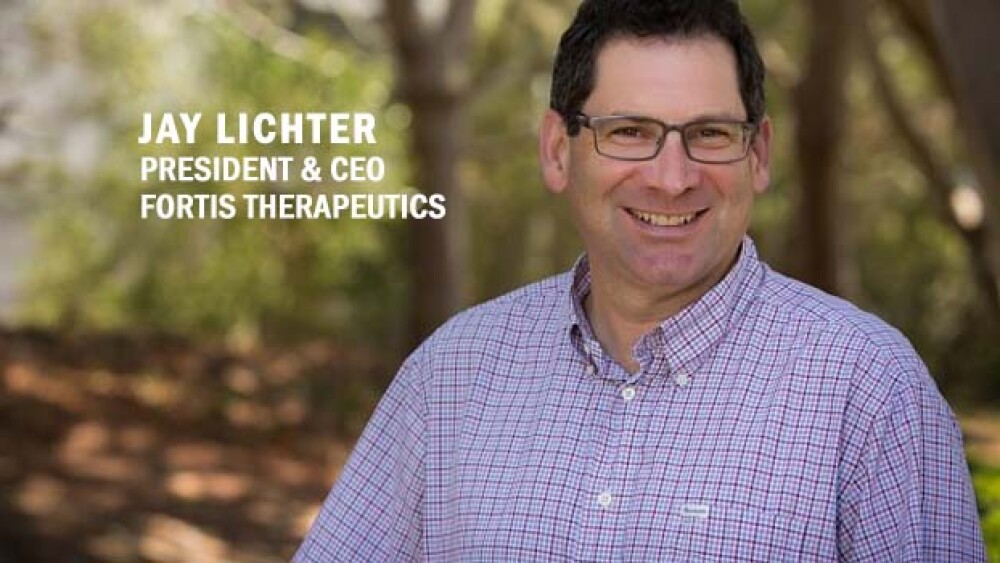Fortis Therapeutics is focused on immuno-oncology, specifically on developing an ADC for multiple myeloma and late-stage prostate cancer, including both the adenocarcinoma and neuroendocrine types.
Fortis Therapeutics is focused on immuno-oncology, specifically on developing an antibody drug conjugate (ADC) for multiple myeloma (MM) and late-stage prostate cancer, including both the adenocarcinoma and neuroendocrine types.
The company’s ADC program came out of the University of California San Francisco laboratory of Bin Liu, and is supported in the clinic by Eric Small and Tom Martin at the UCSF Medical Center.
The company is currently working out of space at COI Pharmaceuticals in La Jolla, Calif., which provides Avalon Ventures’ portfolio companies intellectual and operational support.
Company Leadership
Jay Lichter – Chief Executive Officer. Lichter is the managing director of Avalon Ventures, and acts as the president and chief executive officer of COI Pharmaceuticals. He often acts as the chief executive officer of many of COI’s companies, leading both their business and scientific operations during the companies’ early periods of development. He is also the chairman of the board of Synthorx, an Avalon company.
Marc Nasoff – Chief Scientific Officer. Nasoff is COI’s chief scientific officer. Most recently, he served as the director of biologics at GNF, a subsidiary of Novartis Pharma. Before moving to San Diego to work for Pharmacia, he worked at Genetics Institute in Boston.
Tighe Reardon – Chief Financial Officer. Reardon is COI’s chief financial officer. Prior to joining COI, he was Senior Vice President of Tax and Treasury at DJO Global.
Company Financing
In September 2016, Fortis closed on an $18 million Series A financing. It was led by Avalon Ventures and was joined by Bregua Corporation, Lilly Asia Ventures, Osage University Partners and Vivo Capital.
Lichter told BioSpace, “The financing is really to push the compound into the clinic. We’re hoping to have our IND filed by April or May of 2018, a trial open by June, and dosing by July or August. We’re close. One of the key investment pieces, why we had so many people interested in funding it, is we knew we were 18 months, maybe less, from the clinic and people like to invest in clinical programs. Sometimes a little bit earlier to get your arms around.”
Pipeline
Fortis has a compound that targets CD46. Lichter said, “You can call it a compound, but I wouldn’t necessarily consider it a pipeline. It’s more or less a single-asset play, where we move this product candidate forward. We have a variety of supporting data showing activity in different cancers and we have other modalities — CAR-T data that looks pretty interesting — but it’s not like we have a pipeline of multiple molecules. Fortis is an entity that was set up to move this asset forward.”
Market Competition
Although there are numerous immuno-oncology companies, with Gilead Sciences and Novartis currently leading the way with approved CAR-T therapies, Lichter said Fortis is the only one working on CD46. “That differentiates us. That molecule is primarily involved in getting nutrients from the microtumor environment to feed the tumor and it does this by a mechanism called chemocytosis, where little vesicles are formed and suck micronutrients into the cell. The antibody-conjugate binds to this target and will be actively transported in due to the inherent mechanism of this target.”
Dollars and Deals
At this point, Fortis isn’t making any deals, and that’s by design. “We haven’t started to have conversations with anybody. Some groups have contacted us, but we’ve pushed back. We know it’s too early. We have enough capital at the table to do the clinical trials and our feeling is once those trials start and we have data, maybe we’ll have those conversations when there’s something interesting to talk about,” Lichter said.
What to Look For
Although something of an oversimplification, COI and Avalon tend to focus on single-asset companies and building them to a point where they get acquired by bigger companies. Lichter, when asked where he expects Fortis to be in three to five years, said, “Obviously, the best outcome is somebody bought us and we don’t exist. If the trial works really well and there’s discussion and negotiations and we sell the company, realistically that would be in the early-2020s kind of timeline, the best outcome. The second-best outcome would be to do a financing to basically run ourselves. That would also be in the 2020 range, maybe 2023, when we have basic Phase II data.”
See Top Life Science Startups 2018
See Top Life Science Startups 2017
See Top Life Science Startups 2016
See Top Life Science Startups 2015





